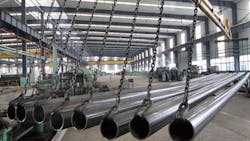EU Takes China to WTO Over Steel Anti-Dumping Duties
BRUSSELS—The European Union challenged China, one of its biggest trade partners, at the World Trade Organization today over tariffs on imports of stainless steel pipes, in the latest of a series of disputes that has sparked fears of a trade war breaking out.
The EU said it had "requested consultations with China" at the WTO, charging that its anti-dumping duties were "incompatible with WTO law, both on procedural and on substantive grounds."
This is the first formal step in the WTO's complaint procedure, which "will give the EU and China the opportunity to find a negotiated solution," the EU said, adding, "If the consultations are not successful, after 60 days the EU can ask the WTO to establish a panel to rule on the case."
The European Commission, the bloc's executive arm, noted that Tokyo had filed a similar complaint earlier this year, with the WTO then deciding to set up a dispute settlement panel.
Combined Complaints
In the past, the WTO has often folded multiple complaints into a single case, potentially a major test for China which joined the body in 2001 only after exhaustive negotiations.
Nations can ask the WTO to judge whether fellow members are in breach of the rules of international commerce and can be granted the right to impose retaliatory measures.
The commission said the anti-dumping tariffs levied at 9.7% to 11.1% "are significantly hampering access to the Chinese market."
Earlier this week, the commission said it would defend Europe's struggling steel industry—which has been hit by falling demand, rising costs and fierce competition from China—with every means at its disposal.
Steel, Wine, Solar Panel Disputes
The latest EU move raises the stakes in a series of tit-for-tat disputes, and the mention of Japan—whose ties with China are strained—may be noted disapprovingly in Beijing.
In addition to steel tubes, Beijing has launched anti-dumping action into imports of EU wine and chemicals after the EU imposed punitive tariffs on Chinese solar panels and threatened an investigation into China's key telecom equipment firms.
Beijing warned that the wine probe—announced just after the solar panel decision—"signals that the country will safeguard its major economic interests—and it has ample cards in hand to do so."
"The probe into wine imports could be followed by more moves if the EU continues to ignore China's interests," the state-run China Daily newspaper said last week.
The government-run paper also highlighted the Eurozone's "lingering debt crisis," saying EU protectionism "will only incur tit-for-tat retaliations and worsen its economic prospects."
Battle Strategy
The Global Times was even blunter.
"China has many cards to play, including significant [holdings of] European bonds and investment in EU countries," The Global Times said. "It is the situation on the battlefield which determines how negotiations proceed in warfare. Trade wars are similar."
Earlier this week, EU officials insisted that no link should be made between a specific trade defense measure, as in the case of Chinese solar panels, and action taken at the WTO which took months to put together. The timing was a coincidence, the EU officials said.
China is the EU's second-biggest trading partner, taking EU imports worth $212 billion last year and exporting $334 billion.
Given the huge stakes, the prospect of a stand-off with Beijing has stoked deep divisions in the EU, with Germany pushing for a negotiated solution while France says tough sanctions are needed to defend EU interests against unfair Chinese inroads.
EU-China trade ties will be discussed Friday when EU trade ministers meet in Luxembourg to discuss opening talks with the United States on what would be the world's biggest Free Trade Agreement.
Bryan McManus
Copyright Agence France-Presse, 2013
About the Author
Agence France-Presse
Copyright Agence France-Presse, 2002-2025. AFP text, photos, graphics and logos shall not be reproduced, published, broadcast, rewritten for broadcast or publication or redistributed directly or indirectly in any medium. AFP shall not be held liable for any delays, inaccuracies, errors or omissions in any AFP content, or for any actions taken in consequence.
